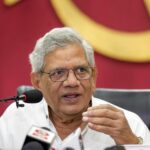By Krishna Jha
Bombay high court has quashed the amended Information and Technology rules that enable the Centre to set up its own Fact Check Unit (FCU). Justice AS Chandurkar’s order, which set aside the IT Amendment Rules, 2023, broke the tie of the split verdict given earlier by a two-judge bench of the high court regarding the validity of the IT amendment rules. Justice Chandurkar ruled that the terms like “fake or false or misleading news”, on the basis of which the government had sought to act against the social media contents, are not defined. He also declared that the Fact Check Unit is going to be arbiter of government’s own cause, and, therefore, the formation of the FCU itself was unconstitutional.
In the split judgment delivered on January 31, 2024, Justice Gautam Patel had quashed the rule as he found it unconstitutional in its vagueness, and also disproportionate. However, the other judge, Justice Neela Gokhale, in a two judge bench, had differed with him, thus the court ending with a split judgment. Justice Chandurkar’s order has come as the tie breaker. For now, the Centre cannot set up the fact-check unit unless it gets a stay on this order from the top court.
The story of FCU goes back to April 6, 2023, when the ministry of information and broadcasting announced certain amendments to the Information Technology (Intermediary Guidelines and Digital Media Ethics Code) Rules, 2021, including a provision for a fact check unit to identify fake, false, or misleading online content related to the government. The amendments had a purpose and that was to grant the FCU the authority to label online content related to the government as “fake, false or misleading” and order intermediaries to take down such content to retain their “safe harbour” or legal immunity against third-party content.
Following this, standup comedian Kunal Kamra moved the Bombay high court petitioning that the new rules announced by the Centre could potentially lead to his content being arbitrarily blocked or his social media accounts being suspended or deactivated. The Editors Guild of India, New Broadcast and Digital Association and Association of Indian Magazines also filed similar petitions in the matter.
The formation of FCU itself is a violation of Freedom of Expression and also Right to Equality. These were one of the foundations of our Constitution on which our democracy was to be built.
Petitioners argued that the FCU could suppress free speech and lead to arbitrary censorship. Kamra’s petition contended that the rules could unjustly restrict his content, infringing on his right to freedom of expression and his profession.
The amended IT rule was, by all means, an attempt by the government to abridge the Fundamental Rights, and in that sense the government had in fact violated the Constitution itself. A constitutional amendment is required to change the fundamental right but it must not change the basic structure of the Constitution. The Supreme Court has set up this principle in several land mark cases including Kesavanand Bharti in 1973. A constitutional amendment is necessary to change fundamental rights. Both houses of Parliament must pass the amendment with special majority which means with two-thirds of the members present and voting.
Justice A S Chandurkar has ended the dilemma of a split verdict and has brought a direct reply against the draconian step, a forerunner for autocracy. Quashing the possibility of FCU getting set up by the government, the court has reached a definitive decision, safeguarding freedom of speech, the press, and dissent.
The 2023 fact-checking amendment to the IT Rules could have had a significant chilling effect on free speech because of its vague and subjective standards for content removal. Fewer sources of information means misinformation is more likely to spread, not less. The government’s desire to control information about itself cannot justify censorship — the government already has ‘the biggest megaphone and the loudest voice’ to defend itself, as Justice Gautam Patel had noted. Efforts to combat fake news should instead focus on tools to empower individuals to access, share, and verify information freely.
The amendment, if at all enforced, would have allowed the Indian government to label content about its activities as “fake,” “false,” or “misleading,” and demanded its removal — ultimately handing authorities control over what people can say about them online. It would have made the government, as Justice Patel noted, the final authority on the ‘right to place an opposing point of view’. Social media intermediaries — such as Facebook or YouTube — could have been held liable if they failed to comply with the directives of the government’s fact-checking body. The amendment would have taken away the right to criticism and dissent of over one billion people in India. It would have been a major blow to independent and investigative journalism and people’s ability to hold authorities accountable. It was neither necessary nor proportionate, and it needed to be declared unconstitutional.
Freedom of speech is already under growing threat in India. The Telecommunications Act, 2023, puts encrypted communications in jeopardy, while the draft Broadcasting Bill is set to impose stifling regulations on all news and current affairs broadcasters. Other parts of the IT Rules, 2021, also undermine free speech and privacy and are subject to multiple legal challenges across India. (IPA Service)

 A Personal Tribute To The CPI(M) General Secretary Sitaram Yechury
A Personal Tribute To The CPI(M) General Secretary Sitaram Yechury 